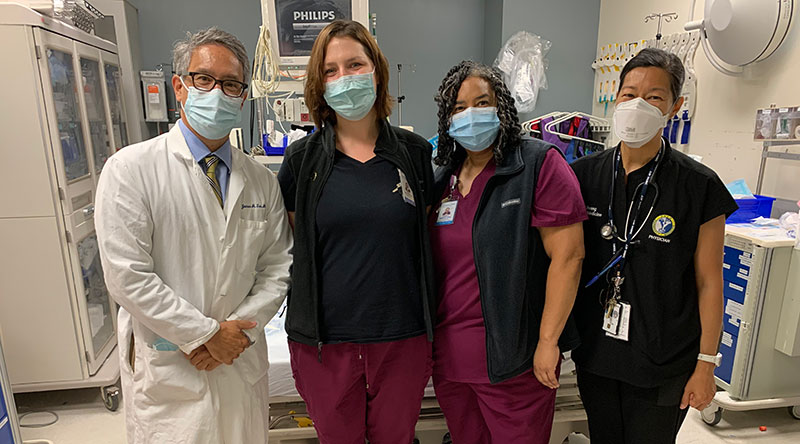
YNHHS recently received Geriatric Emergency Department Accreditation Health System Status from the American College of Emergency Physicians. From left are James Lai, MD, medical director, YNHH Center for Restorative Care for Older Adults (Verdi 4 West), and associate chief of clinical affairs, Internal Medicine/Geriatrics, Yale School of Medicine; Sarah Palleschi, PA, and Pamela Martin, APRN, Geriatric Emergency Team; and Ula Hwang, MD, YNHH attending emergency physician.
YNHHS first system in the state to achieve Geriatric ED accreditation
One size does not fit all, and a trip to the emergency department is no exception.
For the increasing older adult population, a hospital admission has long been a typical outcome of an ED visit. But a new look at the specific needs of older patients arriving in the ED has led to improved standards of geriatric care that may reduce the risk of hospitalizations – and has earned a distinguished designation for Yale New Haven Health.
YNHHS recently became one of only 13 health systems nationwide to receive Geriatric Emergency Department Accreditation (GEDA) Health System Status by the American College of Emergency Physicians (ACEP). The accreditation means that all nine emergency departments within YNHHS have met specific criteria for high-quality care of older adults.
“This tells our older adult population that our emergency departments are focused on providing resources and care specific to them,” said Ula Hwang, MD, a Yale New Haven Hospital attending emergency physician and professor of Emergency Medicine at Yale School of Medicine, who led the YNHHS effort.
YNHHS hospitals receiving Level 3 GEDA accreditation include Yale New Haven Hospital (York Street, Saint Raphael and Shoreline Medical Center), Greenwich Hospital, Lawrence + Memorial Hospital (and Pequot Health Center in Groton) and Westerly Hospital. They join Bridgeport Hospital, the first in the state to earn the GEDA distinction, in 2019, and its Milford campus, which both achieved Level 2 status.
Each ED is accredited for three years and may continue to work toward a Level 1 designation, which indicates the highest level of resources available.
To admit – or not to admit?
“Geriatric patients tend to take more time and resources in the emergency room,” said Mark Sevilla, RN, YNHH vice president of Emergency Medicine and Behavioral Health. “The ACEP found that when you have the right medical care teams – physicians, nurses, social workers and others trained in caring for geriatric patients – you can actually reduce the number of patients being admitted to the hospital from the ED.”
“In the past, some older patients would be admitted for an inpatient evaluation, often for non-medical, social and functional support reasons,” Dr. Hwang explained. “Now, we can align resources so that patients can have a workup done by specialists earlier, while they are still in the ED.”
This includes assessing patients’ medications, ability to function and walk, and ability to care for themselves at home.
“With appropriate assessments and resources, you can discharge more people to their homes or to outpatient services, which is a good thing, because we know people are better off recovering at home than in the hospital, if their condition allows it,” Sevilla said.
A collaborative effort
Dr. Hwang joined YNHH in 2020, bringing years of emergency physician experience, research interests in improving ED care for older adults, and service on task forces helping to shape national geriatric ED guidelines. Since arriving, she has worked with other staff and Geriatrics Services throughout YNHHS to implement the guidelines and apply for GEDA.
With systemwide accreditation now in place, geriatric-specific staff training will continue, with the goal of positive outcomes that include cost savings to patients and the hospitals.
“When I’ve done this in other hospitals, we’ve demonstrated that these types of programs actually do reduce admission rates, along with 30-day readmission rates and total cost of care for the patient,” Dr. Hwang said. “I’m hoping we’ll see similar results here.”